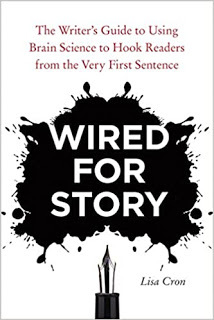Cate's Favorite Writing Books Series - #2
Hello everyone. It's that time of the month again. I'm back with another craft book post and giveaway.
This week I'm sharing a post I did many years ago on the original Seekerville.
Wired for Story: The Writer's Guide to Using Brain Science to Hook Readers from the Very First Sentence. By Lisa Cron
How can a title like that not snag your interest?

The back cover blurb says:
Imagine knowing what the brain craves from every tale it encounters, what fuels the success of any great story, and what keeps readers transfixed. Wired for Story reveals these cognitive secrets - and it's a game changer for anyone who has ever set pen to paper.
That was enough to convince me to purchase a copy! (Clearly bookstores have reason to love me!)
I'm really, really glad I did. I've learned so much about storytelling from this book. My copy is full of Post its and underlining and notes written in the margins. I read and thought about my stories, realized where I was going wrong, and got excited about new ways to do it right. And I've learned to look at story in a whole new light.
The book is chock full of so many interesting points that I'd need a month of posts to do it justice. Rather than doing a poor job summarizing, I'm hoping to whet your appetite with some of the more intriguing thoughts, and prompt some discussion on your thoughts about neuroscience and writing.
I also want to use this study of brain science and story as a lens to look at our roles as writers of inspirational fiction.
Calgon Take me Away
Any of you who are a certain age may recall the Calgon ads - usually a harried housewife pleading, "Calgon, take me away."
Stories have always been my Calgon. The one reliable escape from madness.
But according to Lisa Cron, I've had it all wrong. Stories aren't about escape, but rather about survival.
"Recent breakthroughs in neuroscience reveal that our brain is hardwired to respond to story; the pleasure we derive from a tale well old is nature's way of seducing us into paying attention to it." (p. 1)
And why do we have to pay attention?
To survive.
Lisa Cron discussed her book on Writer Unboxed saying,
"By letting us vicariously experience difficult situations and problems we haven’t actually lived through, story bestows upon us, risk free, a treasure trove of useful intel, just in case. And so back in the Stone Age, even though those shiny red berries looked delicious, we remembered the story of the Neanderthal next door who gobbled ‘em down and promptly keeled over, and made do with a couple of stale old beetles instead."
So story is essential to our survival.
What does that have to do with us as writers?
Because of the way our brains are wired, we respond in certain ways. According to Cron, this explains why some stories captivate us while others leave us cold.
She claims writers often mistakenly believe that beautiful prose and fascinating plots make good stories.
Wrong!
Have you ever read a beautifully crafted writing sample that left you feeling nothing? Or one that was so perfectly structured you were conscious of the craft? By contrast, books that are universally acknowledged as horribly written often become mega best sellers.
Why?
Because they appeal to our cravings for story.
What makes a story work is that inescapable need for the brain to know what is going to happen next. That's what keeps us awake at night reading. Curiosity is roused. Your survival instincts kick in. It's a drug - literally. A dopamine* rush.
Sounds easy, right?
Apparently that's another way we go wrong.
Because stories engage our attention effortlessly, they seem easy to write. And that's where our job can become difficult.
"Not only do we crave story, but we have very specific hardwired expectations for every story we read." (p. 10)
For the remainder of the book, Cron goes through these expectations step by step, explaining how we can create our stories in a manner that gives readers that dopamine high. Each section begins with a Cognitive Secret and a related Story Secret.
There's so much more information about mirror neurons, plot expectations, the protagonist as her own worst enemy, meeting reader expectations, etc. So much good stuff that not only do I seriously recommend this book for your own reading, but I'm going to give away a copy to one lucky commenter. More about that in a bit.
Now I'd like to shift the focus slightly. Seeing that this is Seekerville and most of us write inspirational fiction, I couldn't help but think of discussing this book with our particular writing in mind.
We're following in the footsteps of the greatest storyteller ever known. Jesus taught with stories to make lessons accessible and meaningful to his people.
As I read Wired for Story, I couldn't help but wonder, can we use the discoveries of neuroscience to help build the Kingdom of God?
Early in the book, Cron writes;
"Writers can change the way people think simply by giving them a glimpse of life through their characters' eyes. They can transport readers to places they've never been, catapult them into situations they've never dreamed of, and reveal subtle universal truths that just might alter their entire perception of reality." (p. 2)
That can be a powerful burden or an awesome opportunity.
There's so much wonderful information in this book about how to carefully craft your story to meet reader expectations. I think we could easily learn to adapt those techniques to subtly craft a message that inspires.
So what do you think?
Are you interested in learning more about how neuroscience can help you craft engaging stories?
Do you think we should use this knowledge and these skills to evangelize?
Did I thoroughly confuse you?
I can't really begin to do neuroscience credit in one blog post, so I'm offering a copy of Lisa Cron's book, Wired for Story (ebook or paper), as a prize. Please let us know in the comments if you want to be in the drawing. Winner announced in the Weekend Edition.
If you're interested in more information, Lisa Cron has a website here.
*According to Psychology Today, Dopamine is a neurotransmitter that helps control the brain's reward and pleasure centers. Dopamine also helps regulate movement and emotional responses.



